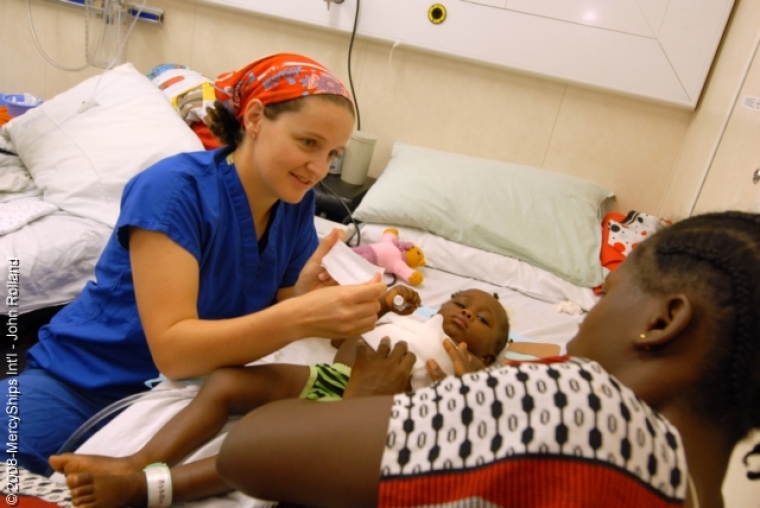
|PIC1|That is how Townville nurse Amy Cassidy sums up her ten-week experience among 450 volunteers from around the world on the world's largest private hospital ship in West Africa.
The Africa Mercy has just completed a ten-month assignment to Liberia, one of the world's poorest nations. It was the third such visit to Liberia in three years and the fourth since the United Nations first invited Mercy Ships to visit Liberia in 2005, prior to the country's free elections ending 14 years of civil war.
Amy worked as a Ward Nurse, caring for post-operative patients recovering from free surgery for a range of conditions related to disability and disfigurement, as well as women recovering from surgery to correct obstetric fistula problems.
"As I walked down the streets of the capital Monrovia I rarely saw people smiling. There are very obvious signs of poverty, a lack of social welfare, an inconsistent system of justice, and a general lack of happiness among the people who have suffered so much from a very long and hurtful war. It is easy to read of such things and see the images on television. In some ways it is just the way we have seen it, but when you are there it is almost surreal in many ways. After ten weeks working among the people of Liberia I feel more a part of their lives and their struggles. It was great to be able to interact with the people, to make them smile and to encourage them that there is a God who is big and who cares for them," she says.
"I first learnt of the work of Mercy Ships through Google when I first started my nurse training. It seemed then to be the perfect opportunity to share my experiences, and to bring a challenge to me through such an experience. During my training I had some great opportunities to try my hand at a variety of aspects of nursing. That meant that I did at least have some form of familiarity with the different operations performed by the volunteer surgeons onboard. Another thing that also helped me to adapt to living in close quarters with others from about 40 different nationalities came from my growing up and moving around different environments."
"The reaction from some of my friends to my decision to offer myself as a volunteer was interesting. Some were intrigued and could not understand why I would be willing to pay my own way to go and work in Africa. Other friends and family have been very supportive and are keen to hear of my experiences."
Getting from Townville to Liberia was quite an experience in itself. "I finished work one day and drove north Cairns and stayed there with friends. The following day, I flew to Brisbane, then on to Hong Kong. After a four-hour stopover, I boarded another eight-hour flight to Qatar, with another short break and on to Dubai. I spent 17 hours in Dubai before catching my five-hour flight to Nairobi, for the five-hour leg to Monrovia with a stopover in Accra, Ghana. In all, it took about three days of constant travel."
There were many highlights during the ten weeks onboard the hospital ship. "One was working with a patient who had his leg amputated below the knee. I was able to spend time giving him encouragement. It was frustrating to hear his story and to know that I was limited in what I could offer him, due purely to the lack of resources. But it was great to share some words with him. I also grabbed a picture from the Internet of a disabled Olympian, and to try and encourage him to forget what was behind and press onwards towards a better future. He was amazed when he saw the picture of someone running on prosthetic legs. It was never tiring to see him smile. I just hope he can keep on smiling in the hard months and years to come."
"Looking back on the whole time away, I would have to say the best thing was the decision to do it. It was great to actually go to Liberia and experience this place for myself. The worst decision was probably forgetting to pack some Vegemite to eat at breakfast. But I did manage to get hold of some from other Aussies onboard," concludes Amy.
Mercy Ships is an international Christian charity that has operated hospital ships in developing nations since 1978. Following the example of Jesus, Mercy Ships brings hope and healing to the poor, mobilizing people and resources worldwide.
Mercy Ships offers a range of health and community development services free of charge. Highly skilled surgeons on board the ships perform thousands of operations each year to correct disability, disfigurement and blindness. Medical and dental teams travel the countries and establish clinics to provide vaccination programs, dental treatment and basic health care for those with no access to these facilities. Local community health workers receive training in hygiene, nutrition and disease prevention. Mercy Ships builds hospitals, clinics, training facilities and basic housing where none exist. Agricultural projects help replenish livestock in war-torn areas and boost food production. Working in partnership with local people, Mercy Ships empowers communities to help themselves. The result is a way out of poverty.
On the Web: www.mercyships.org.au